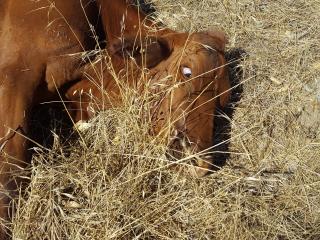| Calling a vet to investigate diseases protects markets |
|---|
| The WA Livestock Disease Outlook provides information about recent livestock disease cases in Western Australia and diseases likely to occur in the next month. Calling a vet to investigate diseases when they occur provides surveillance evidence to our markets that we are free of reportable and trade-sensitive diseases. |
Recent livestock disease cases in WA
Deaths in cattle fed vegetable scraps
- In a mob of 18, one-year-old cattle, seven died and six were affected with dyspnoea and abdominal breathing. The cattle appeared anaemic and were being fed a variety of vegetable scraps (including sweet potatoes), wheat stubble, hay and pellets.
- Histopathology showed a severe, diffuse, subacute interstitial pneumonia with emphysema. A diagnosis was made of toxic interstitial pneumonia likely due to ingestion of mouldy sweet potatoes.
- Sweet potatoes can be colonised by a fungus which causes production of the toxin 4-ipomeanol.
- Differential diagnoses: Fog fever, bacterial pneumonia, bovine respiratory disease complex, bovine anaemia due to Theileria orientalis group (BATOG) where anaemia is present.
- Waste vegetables may be a source of of animal matter as well as toxins. Animal matter-contaminated food constitutes restricted animal material and is illegal to feed to ruminants in Australia.
Respiratory signs and sudden death in cattle in the Midwest
- A total of 14 Droughtmaster cattle from a mob of 180 died suddenly within 7-10 days of being moved onto an oat stubble paddock with others showing respiratory and neurological signs.
- Deaths stopped when cattle were moved to another paddock.
- The cattle showed no further signs until cattle were fed hay cut from the oat stubble paddock. Several days later, 20 cattle died. Sheep fed the same hay were unaffected.
- Testing of the hay samples showed moderate and high risk of annual ryegrass toxicity (ARGT). A faecal test from one of the dead cattle was also positive for ARGT.
- Differential diagnoses: bovine spongiform encephalopathy (exotic) in animals showing neurological signs, thiamine deficiency, grass tetany. Discuss with your DPIRD vet subsidies available for testing where signs may be similar to exotic diseases such as transmissible spongiform encephalopathies.
- Paddock management strategies to reduce the risk of ARGT in livestock include hay testing prior to feeding out, managing grazing of the paddock to remove seed-heads before they become toxic, controlling the ryegrass or sowing a safe ryegrass variety. Read more on these control strategies.


